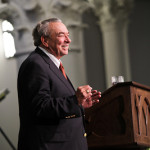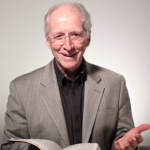 Article by Nicholas Davis – 12 Things the Apostles’ Creed Teaches Us (original source here)
Article by Nicholas Davis – 12 Things the Apostles’ Creed Teaches Us (original source here)
The Apostles’ Creed has been used by Christians around the world since the fourth century. Even though it was not written by the original twelve apostles, every single line in the creed was taught by the apostles and earliest disciples of Jesus. The twelve things the Apostles’ Creed emphasizes are twelve important things we learn about Christianity in the New Testament:
1. God is not only our powerful Creator but is also our caring Father.
The first article gives us confidence in the power of God because all creatures are dependent on him for existence. It also gives us confidence in the love of God: no creature can separate us from our faithful Father.
2. Jesus Christ is our Lord.
The second article reminds us that we are not our own but belong to Jesus who has made us his own. “My Lord and my God!” is the proper confession of a Christian (John 20:28–29). Whether we acknowledge his lordship or not, in heaven and on earth and under the earth, and every tongue confess that Jesus Christ is Lord, to the glory of God the Father” (Phil. 2:10–11). What this confession means for us is that Christ’s reign and rule over us topples every other idol and god—he has saved us from bondage to the world, the flesh, and the devil. We are not our own but belong to Jesus.
3. Jesus was miraculously conceived by the Holy Spirit through Mary.
This third article is important because Jesus’ innocence from conception to the end of his life is what covers all of our sins. Since he was conceived, was born, and lived like us in every respect, yet without sin (Heb. 4:15; 7:26, 27), he is able to redeem us from the curse of God’s holy law. Unlike you and me, and every other person born after the Fall (Gen. 3), Jesus was sinless from conception and birth.
4. Jesus suffered, was crucified by the Romans in the first century, and died.
In this fourth article, we confess that Jesus lived the perfect life and died the death that we deserved in order to save us from the wrath of God. In addition, we are reminded that the Christian faith is a historic faith—Jesus lived and died at the same time that Pontius Pilate, an obscure Roman governor, was ruling. This is not myth or fairytale—Christianity is a faith founded on facts.
5. Jesus rose from the dead.
This fifth article teaches us that by his resurrection Jesus overcame death so that he could make us partakers in his death and resurrection. His resurrection from the dead is a pledge to us that we too will be raised from the dead as he was.
6. Jesus ascended into heaven and is exalted.
In this sixth article, we affirm that Jesus is now our Advocate in heaven before our Father, pleading and interceding on our behalf and for our sake. When he ascended, Jesus also poured out his Spirit upon us, his church, gifting us with a down payment of what is to come.
7. Jesus will return in judgment.
This seventh article is an especially great comfort to those who are suffering and who face persecution. We affirm that Jesus will come to make every wrong right and that his war will be the war to end all wars. All of his people will then enter into glory and have everlasting joy and life.
8. The Holy Spirit is a person of the Holy Trinity.
The eighth article reminds us that the Holy Spirit is a person in the Godhead, just as the Son is God and the Father is God. We are also comforted by the fact that the Holy Spirit unites us to Jesus Christ who is in heaven, and makes us more and more like him each day, and especially on Sunday as we gather to hear the Word preached and partake in the Lord’s Supper.
9. The church is universal.
This ninth article reminds us that since the beginning of time, God has always gathered, defended, and preserved for himself his church. It spans across all ages and in many different places, and it is in this church that all Christians belong.
10. There is a fellowship of Christians across all times and places.
The tenth article concerns the communion of saints. We do not only belong to Jesus Christ, but we belong to one another—to all who share the name of the Triune God and call on the name of Jesus. Since we belong to one another, we should readily share our gifts and any abundance we have with those in need to bless and further Christ’s church on this earth.
11. Our sins are truly and really forgiven in Christ.
The eleventh article is perhaps the sweetest of them all. Because of what Jesus has done for us in his life, death, resurrection, and ascension, God will no longer remember our sins. To all of you who believe in Jesus Christ alone, you are no longer under condemnation.
12. Our bodies will be resurrected. Heaven is real.
The twelfth article finishes with a strong emphasis on the reality of our bodily resurrection. Too often we tend to think of the spiritual life as exclusively soul-related, but it also includes the body. Further, there is no greater comfort than to know that in Christ we soon will be in total possession of perfect blessedness—such that no eye has seen, nor ear heard, nor the heart of man imagined. Heaven is for real, and we will be with the Triune God.





